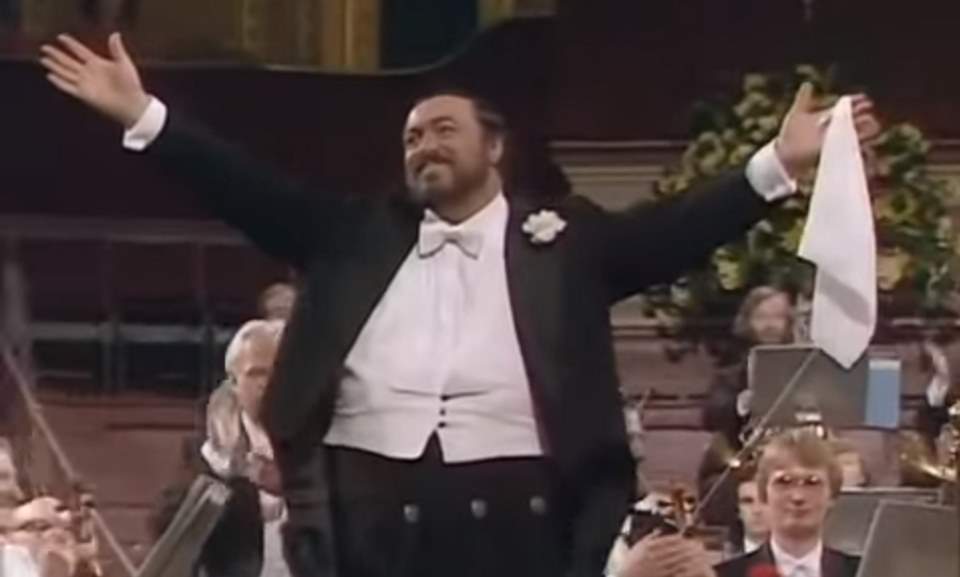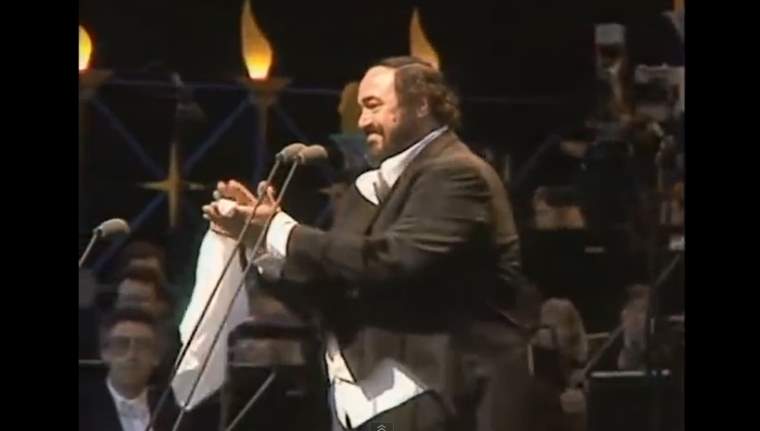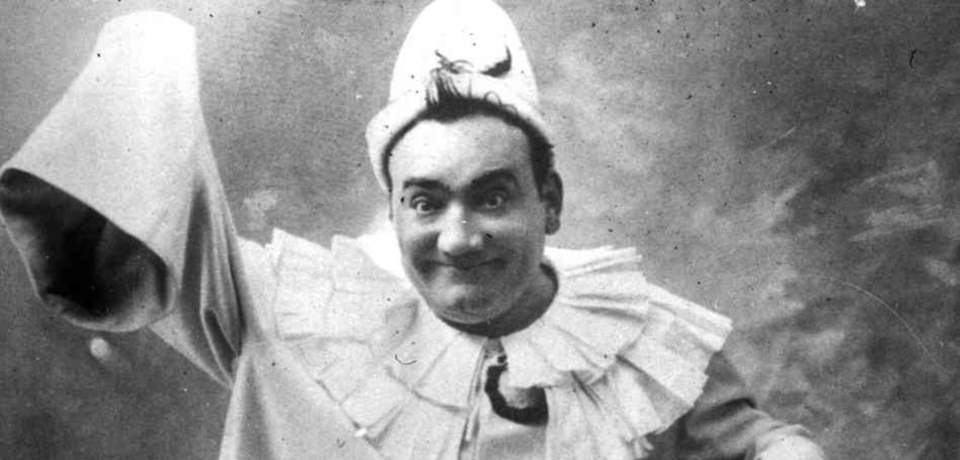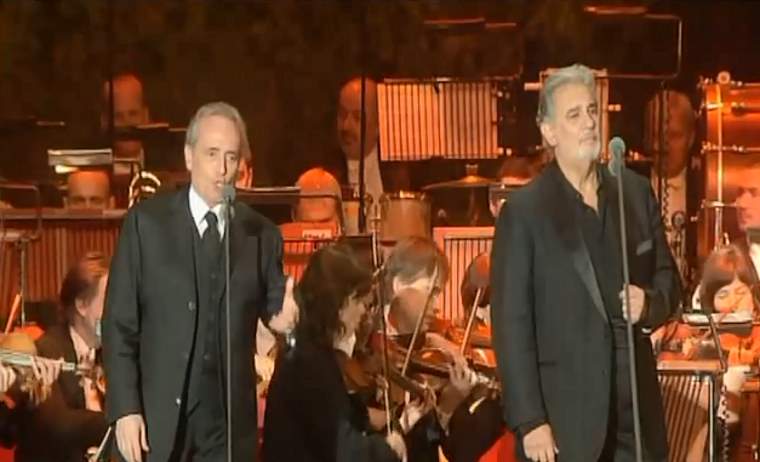A Gala Concert by Luciano Pavarotti at Olympia Hall, Munich, Germany. Munich Radio Orchestra, conductor: Emerson Buckley. Year: 1986.
Pavarotti’s Gala Concert Programme
With start times in the video:
00:27 Rigoletto: Questa o quella (Giuseppe Verdi)
Rigoletto is an opera in three acts by Giuseppe Verdi. The Italian libretto was written by Francesco Maria Piave based on the play Le roi s’amuse by Victor Hugo. Despite serious initial problems with the Austrian censors who had control over northern Italian theatres at the time, the opera had a triumphant premiere at La Fenice in Venice on 11 March 1851.
Questa o quella lyrics (Italian)
Questa o quella per me pari sono
a quant’ altre d’ intorno mi vedo,
del mio core l’ impero non cedo
meglio ad una che ad altre beltà
La costoro avvenenza è qual dono
di che il fato ne infiora la vita
s’ oggi questa mi torna gradita
forse un’ altra doman lo sarà.
La costanza tiranna delcore
detestiamo qual morbo crudele,
sol chi vuole si serbi fedele;
Non v’ha amor se non v’è libertà.
De’ i mariti il geloso furore,
degli amanti le smanie derido,
anco d’ Argo i cent’occhi disfido
se mi punge una qualche beltà.
English translation: This or that
This girl or that girl is equal
to all the others I see around me,
the core of my being I will not yield
to one beauty or another
their attractiveness is what they are gifted
from fate and embellishes life
Perhaps today this girl welcomes me
perhaps tomorrow another girl will demand me.
Constancy is a tyrant to the heart
it is a hated cruel disease to
only those who want you to be faithful;
There can be no love if there is no freedom.
Husbands’ jealous rage,
lovers’ woes I despise,
I defy a hundred eyes of Argo
if I fancy a few beauties.
02:47 Rigoletto: La donna è mobile (Giuseppe Verdi)
“La donna è mobile” (English: The woman is fickle) is the Duke of Mantua’s canzone from the beginning of act 3 of Giuseppe Verdi’s opera Rigoletto (1851). The inherent irony is that the Duke, a callous playboy, is the one who is mobile (“inconstant”).
Its reprise towards the end of the opera is chilling, as Rigoletto realizes from the sound of the Duke’s lively voice coming from within the tavern (offstage), that the body in the sack over which he has grimly triumphed is not that of the Duke after all: Rigoletto had paid Sparafucile, an assassin, to kill the Duke but Sparafucile deceived him by killing Gilda, Rigoletto’s beloved daughter, instead.
The canzone is famous as a showcase for tenors. Raffaele Mirate’s performance of the bravura aria at the opera’s 1851 premiere was hailed as the highlight of the evening. Before its first public performance (in Venice), it was rehearsed under tight secrecy: a necessary precaution, because it proved to be catchy and soon after its first public performance every gondolier in Venice was singing it.
La donna è mobile lyrics (Italian)
La donna è mobile
Qual piuma al vento,
muta d’accento
e di pensiero. Sempre un amabile,
leggiadro viso,
in pianto o in riso,
è menzognero. Refrain
La donna è mobil’.
Qual piuma al vento,
muta d’accento
e di pensier’!
È sempre misero
chi a lei s’affida,
chi le confida
mal cauto il cuore! Pur mai non sentesi
felice appieno
chi su quel seno
non liba amore! Refrain
La donna è mobil’
Qual piuma al vento,
muta d’accento
e di pensier’!
English translation (The woman is fickle)
The woman is flighty.
Like a feather in the wind,
she changes in voice
and in thought. Always a lovely,
pretty face,
in tears or in laughter,
it’s untrue.
Refrain
The woman is flighty.
like a feather in the wind,
she changes in voice
and in thought! Always miserable
is he who trusts her,
he who confides in her
his unwary heart!
Yet one never feels
fully happy
who from that bosom
does not drink love!
Refrain
The woman is flighty.
Like a feather in the wind,
she changes her words,
and her thoughts!
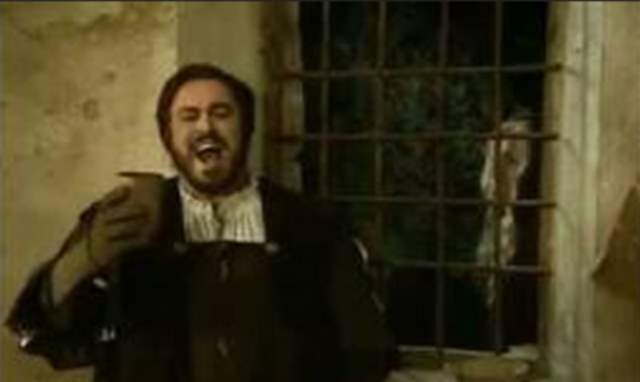
Related: Pavarotti sings La Donna è Mobile
05:23 L’Arlesiana: E la solita storia… Anch’io vorrei “Lamento” (Francesco Cilèa)
The “Lamento di Federico”, “È la solita storia del pastore”, is a famous aria taken from Act II of the opera L’arlesiana by Francesco Cilea. It is sung by Federico, who is deeply in love with a girl from Arles, the Arlesiana of the title, but his family has arranged his marriage with Vivetta.
Vivetta has always loved Federico since childhood and is disappointed to know of his love for l’Arlesiana. When he has been left alone, Federico reads the letters of l’Arlesiana and ponders them with his broken heart.
È la solita storia del pastore lyrics (Italian)
È la solita storia del pastore…
Il povero ragazzo voleva raccontarla
E s’addormì.
C’è nel sonno l’oblio.
Come l’invidio!
Anch’io vorrei dormir così,
nel sonno almen l’oblio trovar!
La pace sol cercando io vo’.
Vorrei poter tutto scordar!
Ma ogni sforzo è vano.
Davanti ho sempre
di lei il dolce sembiante.
La pace tolta è solo a me.
Perché degg’io tanto penar?
Lei! Sempre lei mi parla al cor!
Fatale vision, mi lascia!
Mi fai tanto male! Ahimè!
English translation (It’s the old tale of the shepherd)
It’s the old tale of the shepherd…
The poor boy wanted to retell it
And he fell asleep.
There is oblivion in sleep.
How I envy him!
I too would like to sleep like that
To find oblivion at least in slumber!
I am searching only for peace.
I would like to be able to forget everything!
Yet every effort is in vain.
Before me I always have
her sweet face.
Peace is forever taken from me.
Why must I suffer so very much?
She, as always speaks to my heart.
Fatal vision, leave me!
You hurt me so deeply! Alas!
10:46 Mamma (Cesare Andrea Bixio)
“Mamma” is a popular song first written in 1941 by Cesare Andrea Bixio with Italian lyrics by Bixio Cherubini under the title “Mamma son tanto felice” (Mum, I am so happy). Cesare Andrea Bixio (11 October 1896 – 5 March 1978) was an Italian composer.
Bixio was one of the most popular Italian songwriters of the 1930s, ’40s, and ’50s. The performers of this song included: Beniamino Gigli, Luciano Tajoli, Richard Tucker, Claudio Villa, Robertino Loreti, Violetta Villas, Muslim Mogomayev, Luciano Pavarotti, Toto Cutugno, Andrea Bocelli, Sergio Franchi, Romina Arena, and Mario Frangoulis.
In 1946, the English lyrics were written by Harold Barlow and Phil Brito who had their popular recording hit the charts in May 1946.
Mamma lyrics (Italian)
Mamma, son tanto felice
Perche ritorno da te
La mia canzone ti dice
Ch’ il pi bel sogno per me
Mamma son tanto felice
Viver lontano perche
Mamma, solo per te la mia canzone vola
Mamma, sarai con me, tu non sarai piu’ sola
Quanto ti voglio bene
Queste parole d’amore che ti sospira il mio cuore
Forse non s’usano piu
Mamma
Ma la canzone mia pi bella sei tu
Sei tu la vita
E per la vita non ti lascio mai piu
Sento la mano tua stanca
Cerca i miei riccioli d’or
Sento, e la voce ti manca
La ninna nanna d’allor
Oggi la testa tua bianca
Io voglio stringere al cuor
Mamma, solo per te la mia canzone vola
Mamma, sarai con me, tu non sarai pi sola
Quanto ti voglio bene
Queste parole d’amore che ti sospira il mio cuore
Forse non s’usano piu’
Mamma
Ma la canzone mia piu’ bella sei tu
Sei tu la vita
E per la vita non ti lascio mai piu’
Mamma mai piu’
English translation (Mom)
Mom, I am very happy
because I am returning to you
my song is telling you
that it is the most beautiful day for me
mom I am very happy
why should we live apart?
Mom, only for you
my song flies
mom, you will stay with me
you’ll not be alone anymore
how much I love you
these words of love
that my heart is whispering to you
maybe are not longer used
Mom, but my most beautiful song is you
you are my life
and for the rest of my life I’ll never leave you again
I can feel your tired hand
looking for my golden curls
I can hear, and your voice is a whisper
the lullaby of back then
today, your white head
I want to hold tight to my heart.
15:15 Rondine al nido (Vincenzo di Crescenzo)
Rondine al nido is a beautiful romance and one of the best-known works of the Italian composer Vincenzo de Crescenzo, whose music was in the repertoire of Enrico Caruso, Beniamino Gigli, Tito Schipa, Giuseppe Di Stefano, Richard Tucker, Luciano Pavarotti, Luigi Infantino, Ramón Vargas, Robert Dean Smith, Francesco Albanese, among many others.
Written by de Crescenzo in the early 20th century (circa 1920), it deals with lost love. While written and performed as a Neapolitan song, but with lyrics in Italian, it is more like an aria of the late Romantic period, demanding of the singer high intensity, high notes, and excellent breath control. It begins calmly and lightly, and then it becomes a passionate outburst.
The second stanza repeats this scheme. The song was sung by tenor Agostino Castagnola as The Doctor (EMH) portrayed by Robert Picardo in the 13th episode, Virtuoso, of the sixth season of the science fiction television series Star Trek: Voyager.
The episode was first aired on 26 January 2000 in the United States. The song is performed in Las Vegas at the Bellagio’s fountain, which dances to Luciano Pavarotti’s version of the song. Every performer interprets the song in his own way and there have been several changes from version to version.
Rondine al nido lyrics (Italian)
Sotto la gronda de la torre antica
Una rondine amica,
Allo sbocciare del mandorlo è tornata.
Ritorna tutti gli anni,
Sempre alla stessa data,
Monti e mare essa varca
per tornar.
Solo amore
Quando fugge e va lontano
Speri invano
ma non torna più,
Speri invano
Ma non torna più.
Ne la penombra dolce della sera
Passa la primavera.
Cinguettano le rondini nel volo,
Ebbre di luce e d’aria.
Ed io son triste e solo;
Monti e mare tu non varchi
per tornar.
Mia piccina,
Fosti tutta la mia vita;
Sei fuggita
E non torni più.
Sei fuggita
E non torni più.
English translation (Under the eaves of the old tower)
Under the eaves of the old tower,
as the almond tree blossoms,
a friendly swallow has returned.
Every year she returns,
always on the same day.
She crosses mountains and sea
to get back here.
Only love flees
and does not return.
It makes you hope in vain,
but it does not return.
It makes you hope in vain,
but it does not return.
In the soft twilight of evening
springtime is passing.
The swallows’ chatter in their flight –
they are drunk with light and air.
But I am sad and lonely.
You do not cross mountains and sea
to come back to me.
My little one,
You were my whole life,
but you ran away,
never to return.
You ran away,
never to return!
20:14 Lolita “Spanish Serenade” (Arturo Buzzi-Peccia)
Amor, amor che langue il cor
la sua canzon ti vuol cantar
e ti vo’ dir i suoi martir,
le pene che Lolita può sol calmar.
Ah vien, che i baci che ti vo’ dare,
le stelle in ciel non le potrian contare,
e le carezze ed i sospir
tu sola o bella li potrai ridir.
Amor s’en vien, è l’ora gradita,
senza il tuo ben dimmi come fai Lolita?
Olezza il fior e dolce invita
o mia Lolita vien all’amor.
Ah vien diletta, più non tardare,
che al seno stretta ti vo’ baciare,
ah vien diletta Lolita, vieni
che morire mi farai se tu non vieni.
English translation (Lolita, Spanish Serenade)
Love, love (in) which my heart languishes,
I want to sing you a song,
and I want to tell you (about my) suffering,
(and) the pain that only Lolita can calm.
Come, the kisses I want to give you,
(like) stars in the sky that can’t be counted,
and the caresses and sighs, (and)
your uniqueness or beauty can be repeated (so many times).
O, love comes, it’s (such) a pleasant time,
without your goodness, tell me how to live, Lolita?
The fragrance of flowers that breathed out, and sweet calls,
Oh, my Lolita, comes to love.
Ah come, dear, no more delays,
(come) tightly closed to my breast for me to kiss.
Ah come, dear Lolita, come
that I’ll die if you do not come.
23:34 Fedora: Amor ti vieta (Umberto Giordano)
Fedora is an opera in three acts by Umberto Giordano to an Italian libretto by Arturo Colautti, based on the play Fédora by Victorien Sardou. Along with Andrea Chénier and Siberia, it is one of the most notable works of Giordano.
It was first performed at the Teatro Lirico in Milan on 17 November 1898 conducted by the composer Gemma Bellincioni creating the role of Fedora, and Enrico Caruso as her lover, Loris Ipanov.
Amor ti vieta lyrics (Italian)
Amor ti vieta, di non amar
La man tua lieve,chi mi respinge,
Cerca la stretta,della mia man,
La pupilla esprima Tamo se il labbro dice non Tamero
English translation (Love itself)
Love itself bars you from not loving…
Your light hand that repels me,
still looks for the stroke of my hand:
your eyes exclaim: “I love you”
even when your lips say: “I will not love you!”
26:09 I Pagliacci: Recitar!… Vesti la giubba (Ruggero Leoncavallo)
Vesti la giubba (English: Put on the costume) is a famous tenor aria from Ruggero Leoncavallo’s 1892 opera Pagliacci (Clowns) and is regarded as one of the most moving arias in the operatic repertoire.
It is sung at the conclusion of the first act, when Canio discovers his wife’s infidelity, but must nevertheless prepare for his performance as Pagliaccio the clown because “The show must go on”.
The pain of Canio (Caruso) is portrayed in the aria and exemplifies the entire notion of the ‘tragic clown’: smiling on the outside but crying on the inside.
This is still displayed today as the clown motif often features the painted-on tear running down the cheek of the performer. Pagliacci is the only Leoncavallo opera that is still widely staged.
Vesti la giubba lyrics (Italian)
Recitar! Mentre preso dal delirio,
non so più quel che dico,
e quel che faccio!
Eppur è d’uopo, sforzati!
Bah! Sei tu forse un uom?
Tu se’ Pagliaccio!
Vesti la giubba e la faccia infarina.
La gente paga, e rider vuole qua.
E se Arlecchin t’invola Colombina,
ridi, Pagliaccio, e ognun applaudirà!
Tramuta in lazzi lo spasmo ed il pianto
in una smorfia il singhiozzo e ‘l dolor, Ah!
Ridi, Pagliaccio,
sul tuo amore infranto!
Ridi del duol, che t’avvelena il cor!
English translation (Put on the costume)
Act! While in delirium,
I no longer know what I say,
or what I do!
And yet it’s necessary… make an effort!
Bah! Are you not a man?
You are a clown!
Put on your costume and powder your face.
The people pay to be here, and they want to laugh.
And if Harlequin shall steal your Columbina,
laugh, clown, so the crowd will cheer!
Turn your distress and tears into jest,
your pain and sobbing into a funny face – Ah!
Laugh, clown,
at your broken love!
Laugh at the grief that poisons your heart!
29:58 Chitarra Romana (Eldo Di Lazzaro)
Chitarra Romana is a song by Italian singer and composer Eldo di Lazzaro (1902-1968).
Chitarra Romana lyrics (Italian)
Sotto un manto di stelle
Roma bella mi appare,
solitario il mio cuor disilluso d’amor.
vuol nell’ombra cantar
Una muta fontana
e un balcone lassù,
o chitarra romana
accompagnami tu.
Suona suona mia chitarra
lascia piangere il mio cuore,
senza casa e senza amore
mi rimani solo tu.
Se la voce è un pò velata
accompagnami in sordina,
la mia bella fornarina
al balcone non c’è più.
Lungotevere dorme
mentre il fiume cammina,
io lo seguo perchè mi trascina con sè
e travolge il mio cuor.
Vedo un ombra lontana
e una stella lassù,
o chitarra romana
accompagnami tu.
Se la voce è un pò velata
accompagnami in sordina,
la mia bella fornarina
al balcone non c’è più.
O chitarra romana
accompagnami tu!
English translation (Roman guitar)
Under a starry mantle
I find Rome beautiful,
my lonely heart let down by love
wants to sing in the shadows
A silent fountain
and a balcony above,
oh a roman guitar
accompany me.
Play play guitar of mine
let my heart weep,
without home and without love
only you are there for me.
If the phonation is a little veiled
accompany me softly,
my beautiful lil’bakeress
isn’t on the balcony anymore.
Tiber’s waterside sleeps
while the river strolls,
I follow ’cause it carries me along
and sweeps my heart away.
I see a distant shadow
and a star up there
oh roman guitar
accompany me.
If the phonation is a little veiled
accompany me softly,
my beautiful Fornarina
isn’t on the balcony anymore.
Oh roman guitar
accompany me.
33:43 La mia canzone al vento (Cesare Andrea Bixio)
A song by Cesare Andrea Bixio.
La mia canzone al vento lyrics (Italian)
Sussurra il vento come quella sera
vento d’aprile di primavera
che il volto le sfiorava in un sospiro
mentre il suo labbro ripeteva giuro
ma pur l’amore ? un vento di follia
che fugge… come sei fuggita tu.
Vento, vento
portami via con te
raggiungeremo insieme il firmamento
dove le stelle brilleranno a cento
e senza alcun rimpianto
voglio scordarmi un giuramento
vento, vento
portami via con te.
Tu passi lieve come una chimera
vento d’aprile di primavera
tu che lontano puoi sfirarla ancora
dille ch’io l’amo e il cuore mio l’implora
dille il ch’io fremo dalla gelosia
solo al pensiero che la baci tu.
Vento. Vento
portami via con te
tu che conosci tutte le mie pene
dille che ancor le voglio tanto bene
sotto le stelle, chiare
forse ritorner? l’amore
vento, vento
portami via con te.
Sussurra il vento come quella sera
perch? non torni ? primavera.
English translation (Whispers the wind like that night)
Whispers the wind like that night
April wind of spring
that touched the face with a sigh
while his lip repeated swear
but still, love? a wind of madness
who escapes… you as you run away.
Wind, wind
take me away with you
together we will reach the sky
where the stars will shine a hundred
and no regrets
I want to fancy an oath
wind, wind
take me away with you.
You walk as light as a chimera
April wind of spring
You can sfirarla that far yet
tell her that I love her and my heart begs the
I tell her the quiver with jealousy
at the thought that the kisses you.
Wind. Wind
take me away with you
you who know all my pains
tell her you still love her so well
under the stars, clear
returner perhaps? love
wind, wind
take me away with you.
Whispers the wind like that night
why? do not come back? spring.
37:28 Non ti scordar di me (Ernesto De Curtis)
Non Ti Scordar di Me (Don’t Forget About Me) is a song composed by the Italian composer Ernesto De Curtis (October 4, 1875- December 31, 1937). It is originally written for the legendary Italian tenor Beniamino Gigli (March 20, 1890 – November 30, 1957), who sang it in his 1935 film of the same name.
Non ti scordar di me lyrics (Italian)
Partirono le rondini dal mio paese
freddo e senza sole,
cercando primavere di viole,
nidi d’amore e di felicita.
La mia piccola rondine parti
senza lasciarmi un bacio,
senza un addio parti.
Non ti scordar di me:
la vita mia legata e a te.
Io t’amo sempre piu,
nel sogno mio rimani tu.
Non ti scordar di me:
la vita mia legata e a te.
C’e sempre un nido nel mio cor per te.
Non ti scordar di me!
Non ti scordar di me!
English translation (Don’t forget about me)
The swallows left
From my cold and sunless country,
Searching for Springs full of violets
And lovely and happy nests.
My little swallow left
Without leaving me a kiss
She left without a goodbye
Don’t forget about me:
My life is tied to you
I love you more and more
In my dream, you stay
Don’t forget about me
My life is tied to you
There’s always a nest
In my heart for you
Don’t forget about me!
43:54 Manon Lescaut: Donna non vidi mai (Giacomo Puccini)
Manon Lescaut is an opera in four acts by Giacomo Puccini. The story is based on the 1731 novel L’histoire du chevalier des Grieux et de Manon Lescaut by Abbé Prévost and should not be confused with Manon, an 1884 opera by Jules Massenet based on the same novel.
The libretto is in Italian and was cobbled together by five librettists whom Puccini employed: Ruggero Leoncavallo, Marco Praga, Giuseppe Giacosa, Domenico Oliva, and Luigi Illica.
The publisher, Giulio Ricordi, and the composer himself also contributed to the libretto. So confused was the authorship of the libretto that no one was credited on the title page of the original score. However, it was Illica and Giacosa who completed the libretto and went on to contribute the libretti to Puccini’s next three – and most successful – works, La Bohème, Tosca, and Madama Butterfly.
Donna non vidi mai lyrics (Italian)
Donna non vidi mai, simile a questa!
A dirle: “io t’amo,”
a nuova vita l’alma mia si desta.
“Manon Lescaut mi chiamo!”
Come queste parole profumate,
mi vagan nello spirto
e ascose fibre vanno a carezzare.
O sussurro gentil,
deh! non cessar,
English translation (I have never seen a woman, such as this one)
I have never seen a woman, such as this one!
To tell her: ” I love you”,
my soul awakens to a new life.
“Manon Lescaut is my name.”
How these fragrant words
wander around in my mind.
And come to caress my innermost fibers.
Oh! sweet thoughts,
Ah, do not cease!
48:24 ‘O sole mio (Eduardo Di Capua)
Eduardo Di Capua was born in Naples in 1865. Together with the poet Giovanni Capurro, di Capua wrote the song “‘O Sole mio“, which has since been recorded by many singers, both classical and popular. He also wrote “Marie, Ah Marie” (“O Marie” in English), another Neapolitan song. Eduardo Di Capua died in 1917 in Naples.
“O sole mio” is a globally known Neapolitan song written in 1898. Its lyrics were written by Giovanni Capurro and the melody was composed by Eduardo di Capua. There are other versions of “‘O sole mio” but it is usually sung in the original Neapolitan language.
‘O sole mio is the Neapolitan equivalent of standard Italian Il sole mio and translates literally as “my sunshine”.
‘O sole mio lyrics (Neapolitan)
Che bella cosa è na jurnata ‘e sole,
n’aria serena dopo na tempesta!
Pe’ ll’aria fresca para già na festa…
Che bella cosa na jurnata ‘e sole.
Ma n’atu sole cchiù bello, oi ne’,
‘o sole mio sta nfronte a te!
‘o sole, ‘o sole mio, sta nfronte a te,
sta nfronte a te!
Quanno fa notte e ‘o sole se ne scenne,
me vane quasi ‘na malincunia;
sotta ‘a fenesta toia restarria
quanno fa notte e ‘o sole se ne scenne.
Ma n’atu sole cchiù bello, oi ne’,
‘o sole mio sta nfronte a te!
‘o sole, ‘o sole mio, sta nfronte a te,
sta nfronte a te!
English translation (My Sunshine)
What a beautiful thing is a sunny day!
The air is serene after a storm,
The air is so fresh that it already feels like a celebration.
What a beautiful thing is a sunny day!
But another sun that’s brighter still,
It’s my own sun that’s upon your face!
The sun, my own sun, it’s upon your face!
It’s upon your face!
When night comes and the sun has gone down,
I almost start feeling melancholy;
I’d stay below your window
When night comes and the sun has gone down.
But another sun that’s brighter still,
It’s my own sun that’s upon your face!
The sun, my own sun, it’s upon your face!
It’s upon your face!
53:10 Torna a Surriento (Ernesto De Curtis)
“Torna a Surriento” is a Neapolitan song said to have been composed in 1902 by Ernesto De Curtis to words by his brother, Giambattista. The song was copyrighted officially in 1905; it has since become wildly popular.
Torna a Surriento lyrics (Italian)
Vide ‘o mare quant’è bello!
spira tanta sentimento…
Comme tu, a chi tiene mente,
ca, scetato, ‘o faje sunná!
Guarda guá’ chistu ciardino,
siente sié’ sti sciure ‘arancio…
nu prufumo accussí fino,
dint”o core se ne va…
E tu dice: “Io parto, addio!”
T’alluntane da stu core…
Da la terra de ll’ammore,
tiene ‘o core ‘e nun turná?!
Ma nun mme lassá,
nun darme stu turmiento…
Torna a Surriento:
famme campá!…
Vide ‘o mare de Surriento
che tesore tene ‘nfunno:
Chi ha girato tutt”o munno,
nun ll’ha visto comm’a ccá!
Guarda, attuorno, sti Ssirene
ca te guardano ‘ncantate
e te vònno tantu bene:
Te vulessero vasá!…
E tu dice: “Io parto, addio!”
T’alluntane da stu core…
Da sta terra de ll’ammore,
tiene ‘o core ‘e nun turná?!
Ma nun mme lassá,
nun darme stu turmiento…
Torna a Surriento:
famme campá!…
English translation (Coma back to Sorrento)
See the sea and how beautiful it is,
it inspires all kinds of emotions,
like you with people who care
you make them daydream.
Behold, look at this garden;
sense, smell these orange buds,
there isn’t a perfume so fine,
going straight in your heart
And you say: “I’m leaving, goodbye!”
you’re walking away from this heart,
from this land of love:
do you have the heart not to return?
But don’t leave me,
don’t give me this torment,
come back to Sorrento,
make me live!
See the sea of Surriento,
the buried treasure it has!
Those who traveled all over the world,
haven’t seen anything like it.
Behold these Sirens all around
that look at you enchanted,
and love you so much;
they’d love to kiss you,
And you say: “I’m leaving, goodbye!”
you’re walking away from this heart,
from this land of love:
do you have the heart not to return?
But don’t leave me,
don’t give me this torment,
come back to Sorrento,
make me live!

Related: Mario Lanza sings Torna a Surriento
Sources
- Rigoletto on Wikipedia
- La donna è mobile on Wikipedia
- È la solita storia del pastore on Wikipedia
- Rondine al nido on Wikipedia
- Fedora (opera) on Wikipedia
- Manon Lescaut (Puccini) on Wikipedia
